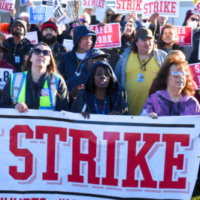Since November 2012, low-wage workers have won more than $60 billion in raises thanks to the Fight for $15 movement to increase the minimum wage
But are the raises actually making it into the pockets of the workers? Unfortunately, many workers don’t see their raises because their employers are not paying them what they’re owed.
According to Fight for $15 member Rosa Rivera, “I’ve spent the last 14 years working at McDonald’s while raising three kids. Yet after all that time, I’m still making less than minimum wage because of wage theft. I’ve probably lost thousands over my 14 years at McDonald’s due to this type of theft.”
What Is Wage Theft and Is It Widespread?
“Wage theft” refers broadly to a failure to pay the minimum wage, failure to comply with overtime pay requirements, the misclassification of workers, requiring employees to work off-the-clock, failing to provide the required meal or rest breaks, stealing employees’ tips, and the myriad other ways in which employers violate basic labor standards.
Wage theft remains an endemic problem in the American workplace and is not isolated to fast food workers. It’s everywhere, and chances are that one or more places we all frequent has engaged in some form of it.
A report by Good Jobs First released earlier this month looked at lawsuits and agency investigations around the country. They analyzed more than 4,000 cases. More than half of the cases involved either Forbes 500 companies or Forbes Global 500 companies.
What Is the Solution to Wage Theft?
In most cases, workers who are owed wages and want to hold their employers accountable face difficult obstacles. Workers know that reporting unlawful activity could result in their immediate firing, demotion, harassment, deportation, blacklisting, discrimination, and more. Employers often do not keep the records they’re supposed to keep, making it difficult to prove violations.
A federal proposal, the Wage Theft Prevention and Wage Recovery Act, would go far in tackling this massive challenge. It incorporates many of the best practices that states and advocates across the country have developed, and it can offer a model for states and cities trying to do better.
How Would This Act Prevent Wage Theft?
Transparency and awareness are key elements to good enforcement. The Act would improve transparency and accountability by requiring employers to give workers important information about the terms of their employment when they are first hired and on future paystubs. The Act would also enable the U.S. Department of Labor to build stronger partnerships with organizations focused on fighting wage theft in order to better educate workers and enforce the laws. We have learned that strong partnerships with local groups can go a long way in improving agency enforcement.
Deterring violations can also be accomplished through the threat of strong penalties. Workers need to know that the risk and investment of their time and resources is worth more than an insignificant punishment for employers who engage in wage theft.
Among other much-needed penalty increases, the Act would create a new civil penalty of $2,000 for the failure to pay the minimum wage or overtime under federal law, and it would increase the penalty for willful or repeat violations to $10,000. The civil penalty for failing to keep the required records would be $1,000 for the first offense and $5,000 for subsequent violations.
Ultimately, even though we have now won over $60 billion in raises for low-wage workers through the Fight for $15, we have a long way to go in ensuring that workers benefit from those wage increases and other labor standards. Our federal policymakers should support the Wage Theft Prevention and Wage Recovery Act as a crucial step forward in supporting and protecting our nation’s workers.




